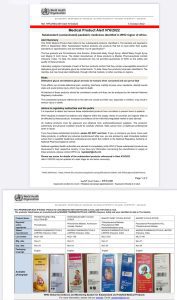The four cold-and-cough syrups are manufactured by Haryana-based Maiden Pharmaceuticals; do not use them, says WHO.

Collage of four cough syrups the World Health Organisation (WHO) issued an alert on after it notified that the same ould be linked to the deaths of 66 children in The Gambia. (WHO)
Suspecting that the deaths of several children in West Africa’s Gambia from kidney-related complications were linked to four cough-and-cold syrups manufactured by an Indian company, the World Health Organization (WHO) issued a medical product alert on Wednesday, 5 October.
“WHO has today issued a medical product alert for four contaminated medicines identified in the Gambia that have been potentially linked with acute kidney injuries and 66 deaths among children,” the WHO said in a series of tweets, citing its Director-General Tedros Adhanom Ghebreyesus.
“The loss of these young lives is beyond heartbreaking for their families.”
The four medicines are cough-and-cold syrups manufactured by Haryana-based Maiden Pharmaceuticals Ltd.
“The four products are Promethazine Oral Solution, Kofexmalin Baby Cough Syrup, Makoff Baby Cough Syrup and Magrip N Cold Syrup,” WHO said.
WHO also said it is “conducting further investigation with the company and regulatory authorities in India”.
“WHO has today issued a medical product alert for four contaminated medicines identified in #Gambia that have been potentially linked with acute kidney injuries and 66 deaths among children. The loss of these young lives is beyond heartbreaking for their families”-@DrTedros
— World Health Organization (WHO) (@WHO) October 5, 2022
Medical officers in Gambia raised an alarm in July after several children began falling ill with kidney-related problems three to five days after taking a locally sold paracetamol syrup.
By August, as many as 28 of them had died and the health authorities expected the toll to increase. Now 66 are dead, WHO said on Wednesday.
Suspecting a link to contaminated syrups, the four products by the Indian pharma company were reported to the WHO in September.
Laboratory analysis of samples of each of the four products confirmed that they contained unacceptable amounts of diethylene glycol and ethylene glycol as contaminants, the WHO said in its medical product alert. These are toxic to human beings.
These contaminants can cause abdominal pain, vomiting, diarrhoea, inability to pass urine, headache, altered mental state, and acute kidney injury leading to death.
“The substandard products referenced in this alert are unsafe and their use, especially in children, may result in serious injury or death,” WHO said.
All batches of these products should be considered unsafe until they can be analysed by the relevant national regulatory authorities, WHO said.
“The four medicines are cough and cold syrups produced by Maiden Pharmaceuticals Limited, in India. WHO is conducting further investigation with the company and regulatory authorities in India”-@DrTedros https://t.co/PceTWc836t
— World Health Organization (WHO) (@WHO) October 5, 2022
Haryana Health Minister Anil Vij told media that the samples of the four paediatric cough syrups manufactutred Maiden Pharmaceuticals and named by WHO have been collected jointly by the team from Drug Controller General of India (DCGI) under Union Health Ministry and the Haryana Food and Drug administration.
The samples were collected on two days — 1 and 3 October — and have been sent to the Central Drugs Laboratory in Kolkata for examination, he said.
The reports are awaited.
It is not yet clear whether these products have been distributed in India. However, as Maiden Pharmaceuticals is based out of India, the chances of these having been sold locally cannot be ruled out.
Dr Srikanta JT, paediatrician and pulmonlogist at Aster Hospital in Bengaluru said: “We don’t prescribe these syrups. However, chances of it being prescribed in India exists, as the company is based out of India.”
South First reached out to the Drug Controller General of India and the Union Health Ministry, but there has been no official response so far.

WHO raises alarm on four cough syrups manufactured by Indian based Pharma company Maiden Pharmaceuticals Ltd. The four cough syrups are linked to deaths of 66 children in The Gambia. (WHO)
However, sources in the Union Health Ministry confirmed that WHO had sent an initial alert on 29 September and an investigation in this matter has already been initiated by India’s Central Drugs Standard Control Organisation (CDSCO) with the regulatory authorities of the state.
“Whenever any drug is released for usage, it is a practice that the importing country has to test the product. Only if quality parameters are satisfied is it allowed for use. Here, we need to check what happened as the entire batch is contaminated,” explained Dr Gopikrishna G, senior paediatrician at Seva Kshetra hospital in Bengaluru.
Meanwhile, the UN health agency has made it clear that not just a single batch, but all batches of these products should be considered harmful — at least until the relevant national regulatory authorities analyse them.
WHO has advised all countries to remove these products from their markets.
It has also suggested increased surveillance within the supply chains of countries and regions likely to be affected by these products.
“Increased surveillance of the informal/unregulated market is also advised,” the WHO said.
In India there have been earlier incidents of deaths due to contaminated cough syrup usage.
In early 2022, 14 children died in Himachal Pradesh due to the same contaminant — diethylene glycol.
That cough syrup was made by another Indian company which had reportedly failed quality tests more than 15 times.
(The story has been updated with information about Haryana’s action against the pharma firm)

Jun 12, 2023

May 23, 2023

Feb 25, 2023

Oct 13, 2022

Oct 11, 2022